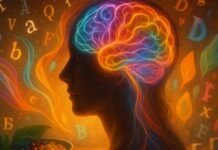The term “Lost Generation” originally referred to a group of writers and artists who came of age during World War I and were profoundly affected by the conflict and its aftermath. Coined by Gertrude Stein and popularized by Ernest Hemingway, it captures the sense of disillusionment and disorientation felt by many young people in the 1920s. This generation struggled to find meaning in a world that had been drastically altered by the horrors of war and the rapid changes of modernity.

American models on a café terrace in Paris in 1925.
© Maurice-Louis Branger / Roger-Viollet
Key figures of the Lost Generation include Hemingway, F. Scott Fitzgerald, T.S. Eliot, and James Joyce. Their works often explore themes of existential angst, the futility of war, and the alienation of modern life. F. Scott Fitzgerald’s “The Great Gatsby”, for example, delves into the hollowness of the American Dream and the moral decay underlying the Jazz Age’s glittering facade.
But we have another “lost generation”; in fact several.
The “Woodstock Generation” typically refers to the Baby Boomers, specifically those who were young adults in the 1960s and 1970s during the time of the famous Woodstock Music Festival in 1969. They are sometimes referred to as the “Lost Generation” in a cultural or societal context, as they challenged many conventional norms and values during a time of significant societal upheaval.
We danced, we sang, we had some of the best music ever and shocked the world by comfortable nakedness. For a time, we glittered on the world stage but then drugs, young-girl prostitution to get money for a “fix” and crime desperation ruined the dream and we were eventually very disillusioned.
The social upheaval and trauma experienced by those who fought in or were otherwise impacted by the Vietnam War, combined with widespread anti-war sentiment, led to references of this group as a “lost generation.” Some courageous youngsters were even spat on when they returned home (disabled vets included).
I’ve heard it said that in more recent times, Millennials who entered the workforce during the recession of 2008-2009 have occasionally been referred to as a “lost generation” due to economic hardship and job scarcity, affecting their financial and professional development. Many never got a job at all and without work or meaning or purpose in life you are indeed lost.
But I want to talk about yet another group referred to as a “Lost Generation” in a seminal 2015 paper published in The Lancet Psychiatry.¹ It grouped together adults with autism spectrum disorder (ASD) and who were not diagnosed as children.
They have struggled wretchedly, in a social and scientific environment which did not recognize their disability; indeed many were diagnosed or at least treated as bad people, personality disorder, antisocial behavior and many other labels that are dismissive or just plain derogatory.
Thing is, it’s not rare, especially if we include other developmental and mental health disorders, lumped together as “minimal brain dysfunction”, such as attention deficit/hyperactivity disorder (ADHD) and bipolar disorder.
Now we are having adults retrospectively diagnosed as ASD in childhood.
The Lost Generation in Mental Health
The “lost” mental health generation primarily comprises individuals who were children before the late 20th century, a period when awareness and understanding of ASD, ADHD, and bipolar disorder were significantly less than today.
Diagnostic criteria were not precise or more often non-existent. During this time, these conditions were often misdiagnosed as behavioral issues or personality traits, leading to inappropriate treatment or no treatment at all during their formative years.
As I said, it’s a very large group, certainly tens of millions in the USA alone. There is an argument I have made often that the problem is a straight spin off from mass vaccinations. Very contentious; very few dare say that. But in a couple of my books I have also pointed out that rise in supermarkets and junk food almost exactly parallels the deterioration in youngsters.
I am proud to claim that I was the first person in the world to spot the connection between the measles vaccine and ASD. This is back around 1983. I was seeing case after case of disastrous deterioration in young kids, starting within a day or two of the jab and sometimes so severe that pediatricians used the label “disintegrative psychosis”.
Thing is, I ask questions… a LOT of questions, including: “What happened around or just before this happened?” By the time I’d sat down with over a dozen weeping Mum’s and got their observations about post-vaccination disorders and it was all the same story, I realized there was a pattern.
I started writing and talking about it. But when it came to being interviewed for radio, I was obliged to say only “It seems as if this followed a vaccination…” That’s caution too far. But then, we’ve known for many decades the media are controlled from outside.
[a little Freudian subconscious blip there: I first typed merdia. Some of you may know that merde is French slang for “shit”!]
Autistic adults may go unrecognized or be diagnosed late in life. In fact, autistic adults are about 30 times less likely than children to be diagnosed. This is particularly so among doctors. In one study, 10% of patients at an institution had autism but went unidentified; they never received a proper diagnosis. In fact the word “autism” didn’t appear in the Diagnostic and Statistical Manual of Mental Disorders until 1980.
Individuals who have grown up without being recognized as on the autism spectrum often struggle with symptoms that were misunderstood, dismissed or overlooked during their childhood years. This late diagnosis can have significant implications for their social, professional, and personal lives. They might have struggled with school, work, relationships, and self-esteem, leading to feelings of isolation, alienation, and resentment.
But it’s not just ASD; ADD and ADHD have plagued many more kids. I myself am notably ADD; all over the place some days. It doesn’t stop you being a powerhouse (it may help that!) but it’s inefficient and at times exhausting.
And was certainly misunderstood by many teachers, who just assumed I was a jerk and many of those were stunned when I walked off with the prizes (Haha!).
Coping Mechanisms
It is a well-documented fact that many adults with conditions like ASD, ADHD, ADD and bipolar disorder develop various coping mechanisms and strategies to hide their symptoms. This phenomenon, often referred to as “camouflaging” or “masking,” involves individuals consciously or subconsciously managing their behavior to fit in with societal norms or expectations.
Masking behavior is particularly common among adults with ASD, including forcing eye contact during conversations, learning to script responses in social situations, or suppressing stimulatory tics and twitches (like hand flapping or rocking)—often called stimming. Some autistic individuals may also develop elaborate strategies to avoid situations that could reveal their autism, such as avoiding social events where they cannot predict or understand the behavior expected of them.
 Infor graphic via SimplyPsychology.org Go visit!
Infor graphic via SimplyPsychology.org Go visit!
Coping behaviors can make it challenging for others, including medical professionals, to recognize signs of autism in adults, contributing to late or missed diagnoses. So a member of your family who always seems cold, distant and mechanical may have Asperger’s syndrome, a relatively mild and common disorder on the autism spectrum!
In the case of ADHD or ADD, adults may develop strategies to manage their symptoms such as using calendars, alarms, and other tools to stay organized. Even that doesn’t work for me!
So, I return to my question: are you part of this particular “lost generation”? If so, just to know that is so has considerable healing potential—it’s hard to solve a problem if you don’t recognize there is a problem!
You don’t have to be a wreck or a failure, as I have explained from my own case. In fact there can be amusement to it. If you have watched the movie Salmon Fishing in The Yemen (yes, even the title is an uproarious joke!) you may have spotted Ian McGregor explaining to a potential girlfriend, “The good thing about Asperger’s is that you canna hurt my feelings.”
Keep smiling!
To Your Good Health,Prof. Keith Scott-Mumby
The Official Alternative Doctor
P.S Have we a new “lost generation” on the way: kids with their lives and social development blighted by the stupid COVID restrictions? Why are they not factoring this in as an obvious toxic side-effect from their supposed “highly successful” measures? Put another way: how many tens of millions of kids have to have their lives ruined to save one person dying of COVID?³
SOURCES:
- https://www.medpagetoday.com/opinion/second-opinions/110016
- https://www.thelancet.com/journals/lanpsy/article/PIIS2215-0366(15)00277-1/abstract
- https://www.ncbi.nlm.nih.gov/pmc/articles/PMC9764868/




